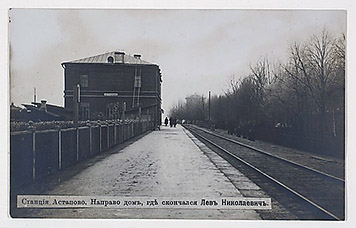
Astapovo station where Tolstoi collapsed and then died; image source.
You would think that there would be a lot of information available online about Tolstoi (1828-1910), especially considering that he is widely considered by just about everybody to have been one of the world's greatest novelists, but I've struggled to find reliable and critical information about Tolstoi online. You can find some basic biographical information about him on the web, but there is not much detail on his work, ideas, or lasting impact, both in Russia and abroad.
Tolstoi was born into an old Russian noble family, and a family that possessed modest wealth (by the standards of the Russian nobility of the early nineteenth century). His estate of Yasnaya Polyana was about four thousand acres, and he possessed somewhere between three and four hundred serfs to work the estate.
Growing up, Tolstoi was not that much different from most Russian nobles of his era. He lived a rather dissolute life drinking and carousing, was not much of a student, loved gambling, and then entered the army (something that a lot of Russian nobles did). In the army he served in the Caucasus and again in the Crimea. His military service in these regions, along with his family memories, served as the main themes for his early writings that established him as an emerging talent in Russia.
War and Peace (Война и мир, 1869) and Anna Karenina (Анна Каренина, 1873-77) made Tolstoi a renowned literary figure and brought him fame as one of the world's greatest novelists. Students in my history classes always laugh when I suggest that they read War and Peace, and not just for the purpose of understanding Russian history. The thought that anyone would read a book that is over 1300 pages long instills fear in the hearts of most people, yet you have to read it. It is such a sweeping novel; the characters so finely drawn; the action taking place on a grand scale; the philosophical ideas peppered throughout the book; it is also thoroughly "Russian."
In his later years, Tolstoi experienced a change of heart. He rediscovered God in a new sort of way outside the strictures of the formal Christian churches and focused on the simpler principles of Christianity that had been preached by Jesus of Nazareth in his Sermon on the Mount. The Russian Orthodox Church did not appreciate Tolstoi's ideas and excommunicated him in 1901.
Some suggested websites
- And so we always start with the Wikipedia entry on Tolstoi. Here's the Russian version.
- My notes on Tolstoi's view of history
- Trotsky’s 1908 tribute to Leo Tolstoy
- Leo Tolstoy Biography on YouTube
- Some of Tolstoi's Works at Project Gutenberg
- Leo Tolstoy (similar material at Biography.com)
- The New York Times obituary from 1910. There are other articles (some rather new, some very old) that deal with Tolstoi from the New York Times newspaper available online.